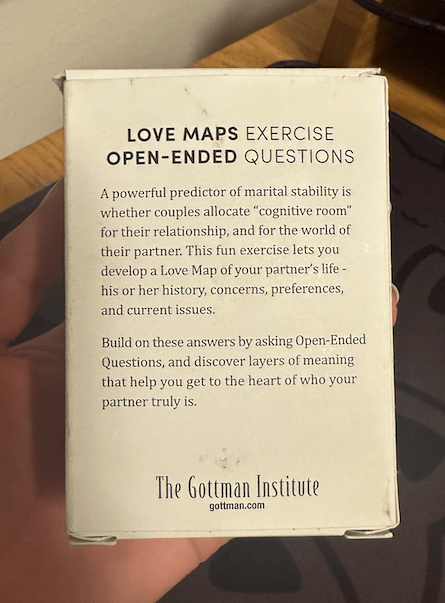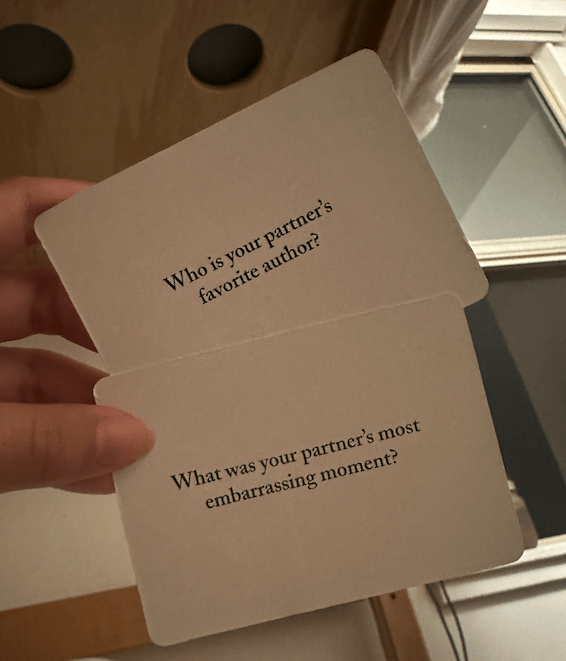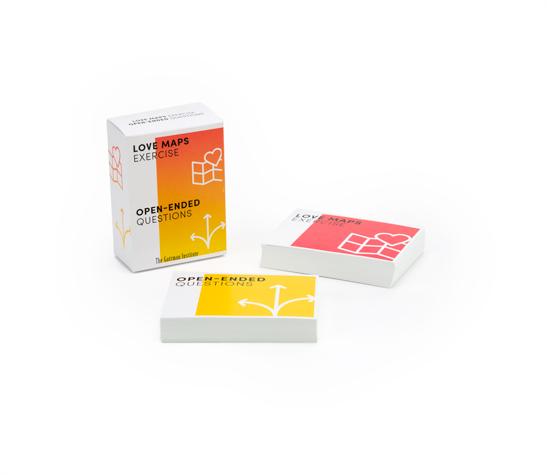For this week’s Critical Play, I chose Love Maps by The Gottman Institute. This is a card game aimed at people in long-term relationships, and I played it with my partner. For this assignment, I chose to play with the “alternating” rules, where the two players alternate drawing cards. In this very simple getting to know you game, each player takes turns drawing a card with a question on it about their partner. They then answer the question to the best of their ability. Finally, their partner reveals to correct answer.
Despite it’s simplicity, Love Maps encourages serious vulnerability between players, leading to building deeper and more intimate relationships.

The first thing I noticed about Love Maps is it’s intended audience, which is couples. In particular, the game markets itself as a relationship therapy tool to help couples build deeper connections. As we learned in class, a game’s intended audience is important for many reasons, among which are determining both which types of dynamics are likely to arise from the mechanics of the game and what types of design decisions the creators can or should make. For example, many of the games I playtested in class are intended for strangers. Because of that, deeper questions can be awkward. But, because Love Maps is aimed at those with exiting relationships who know each other intimately, it’s much more acceptable to have deeper, more intimate questions. Thus, when I encountered questions about sex or trauma, I was much more inclined to share a serious answer. This is in comparison with get to know you games where the players are strangers, where players tend to make jokes to lighten serious questions. Thus, Love Maps’ series of serious questions create a serious dynamic between the players rather than a light hearted one. Out of this arises the aesthetic of feeling vulnerable and truly connecting with the other player on a deeper level.

Secondly, I noticed that not all of the questions are very intimate. Some questions are kind of “gimmie” questions. I encountered, for example, a card which read “What’s your partner’s favorite color?” Another archetype of card was “factual” questions, where you’re asked questions that can be answered by knowing facts about your partner, such as their medical history. This is in contrast to questions I would consider “intimate”, which are usually more open ended and story based, such as questions about your partner’s childhoods and family. Having a variety of card types keeps the game fresh, a common pitfall with getting to know you games where the same type of questions can easily get stale. This not only provides variety to keep the player engaged, it also serves to give players time to process emotionally vulnerable moments rather than repeatedly diving into intimacy. I felt that this slower approach was effective at making me feel more secure in expressing myself in comparison to games that only have “difficult questions”.
One issue I did run into, however, was that my partner continuously drew the “easy” cards while I drew the “difficult” cards. This issue was a bit alleviated, however, because each player is somewhat exposed no matter who’s turn it is, as the player who draws the card needs to consider what they believe the true answer to be while the other player tells the true answer. Because my partner and I didn’t want to seem ignorant about one another or seem like we were not dedicated to the game, we were encouraged to dig deep no matter who’s turn it was. However, I did feel that I learned much more about my partner than he did about me. I feel that one way to balance this could be having a pre-set card order, which could create a narrative which players follow throughout the deck, thus building in balance as well as predetermined moments of rest or reflection.
In summary, I felt that Love Maps was quite well executed, and an enjoyable experience with my partner. It certainly helped us open up and be vulnerable in a way that we normally wouldn’t choose to do so independently. In particular, Love Maps created a deeper and more serious level of vulnerability than many other get to know you games are able to create, and I appreciated that.




